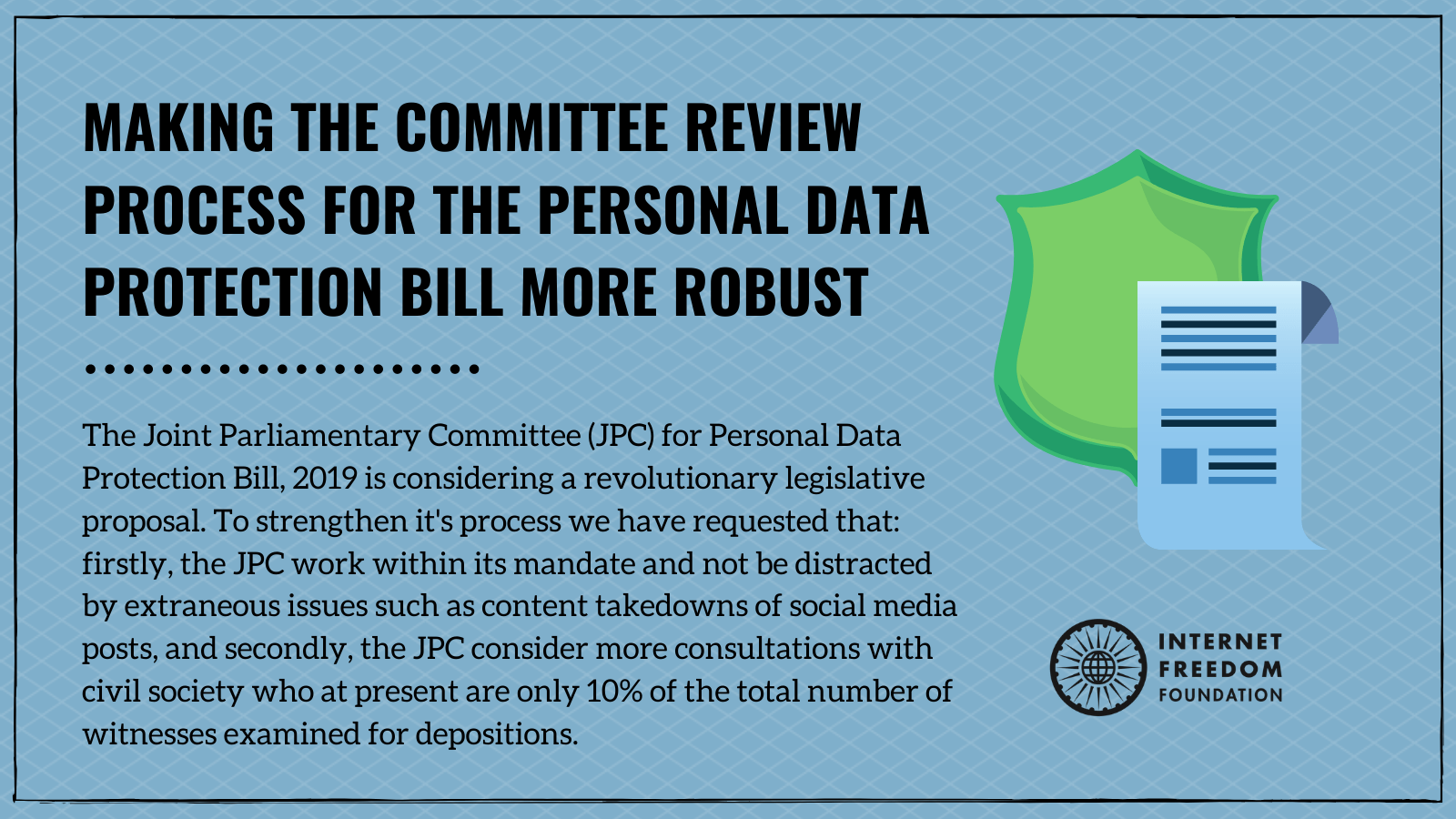
Tl;dr
The Joint Parliamentary Committee (JPC) for Personal Data Protection Bill, 2019 is considering a revolutionary legislative proposal. To strengthen its process we have requested for two things. First, we have humbly requested the Joint Parliamentary Committee to work within its mandate and not be distracted by extraneous issues such as content takedowns of Kunal Kamra's tweets. Second, to provide a fuller perspective, we have asked the Joint Parliamentary Committee to consider more consultations with civil society who at present are only 10% of the total number of witnesses examined for depositions.
Mandate of the Joint Parliamentary Committee
The Joint Parliamentary Committee (JPC) was constituted to examine The Personal Data Protection Bill, 2019 (PDPB). According to press reports, the Committee recently questioned the social media platform Twitter over a recent tweet by comedian Kunal Kamra on which the Ld. the Attorney General of India has granted consent for initiation of contempt proceedings.
Given the mandate and the volume of work to be considered by this Committee, such an action may fall beyond the ambit of the JPC. Further, the Standing Committee of Information Technology already exists and is more than capable of scrutinising such complex matters that involve issues of intermediary liability and content takedowns, it is better if such matter are left to the Standing Committee so that the JPC can fulfil the crucial task of providing a robust framework for the processing of data. This is a tremendous task and there are high public expectations that the JPC will act to safeguard user privacy through this path breaking legislation.
Regardless, on the issue of takedowns, as at present there is an absence of a legal order requiring any such action as per the Shreya Singhal decision of the Supreme Court of India. We have witnessed such a situation Twitter itself before, as we noted in a joint letter endorsed by 243 lawyers when Twitter took down a tweet by Shri Prashant Bhushan (link).
Need for more diverse consultations
The Personal Data Protection Bill, 2019 is an extremely important piece of legislation, and thus the holding of consultations with stakeholders is welcomed. However, as of 20th November 2020, of the 30 consultations held, 19 (63%) had been with industry bodies. Meanwhile, only 3 (10%) consultations have been held with a civil society organisation. Thus, we request the JPC that in the future it hold further consultations with academics, civil society, digital rights experts and organisations, and technologists.
Such groups can offer not only domain expertise but also a unique perspective on how best to regulate the processing of data beyond large technology companies or government departments. By helping the JPC understand how best to not only comprehensively protect the digital rights of the citizens but also ensure that social and economic justice are enshrined in our legislative framework, they can perform an important function and help build a more robust data protection law.
*Kindly note that the Letter dated November 24, 2020 contains an inadvertent error where the name of the chairperson should be spelt as, "Meenakshi Lekhi". We regret this but in all other respects the accuracy of the letter stands.
Important Documents
- Our representation dated November 24, 2020 to the JPC on the Personal Data Protection Bill, 2019 submitting suggestions on improving process (link)
- Our representation dated August 27, 2020 to the JPC on the Personal Data Protection Bill, 2019 to invite diverse stakeholders specially from the civil society sector (link)
- The Personal Data Protection Bill, 2019 as introduced by the Minister for Electronics and Information Technology, Mr. Ravi Shankar Prasad (link)
